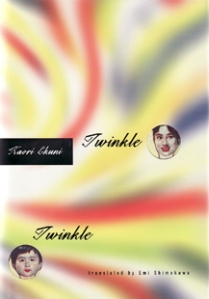
Title: Twinkle Twinkle
Japanese Title: きらきらひかる
Author: Ekuni Kaori (江国香織)
Translator: Emi Shimokawa
Publication Year: 2003 (America); 1991 (Japan)
Pages: 171
About thirty pages into Twinkle Twinkle, I thought to myself, “Are all contemporary Japanese books written by women this depressing?” It’s an interesting literary trend. In America, writers like Kim Edwards (The Memory Keeper’s Daughter, 2005) and Sue Monk Kidd (The Secret Life of Bees, 2004) craft literary paeans to female sisterhood, hope, and endurance, while contemporary Japanese female authors seem to be losing the struggle to gaman, or to deal with the hardships presented to them by Japanese society until they are able to claim some immaterial reward in the far-off future. In short, the new breed of Japanese women writers seems to be cracking under the strain of contemporary Japanese society, which has been slow to acknowledge new gender roles, even as the economic structures that have supported these gender roles have crumbled. Ekuni Kaori’s novel Twinkle Twinkle perspicuously demonstrates the effects of this societal paradox.
Twinkle Twinkle follows the fortunes of the newlywed couple Shoko and Mutsuki. Mutsuki is gay and quite in love with his boyfriend. Shoko is highly emotionally unstable and is quite open about the fact that she doesn’t want to be in a romantic relationship with anyone. Although the pair lives together, and although they are quite affectionate towards one another, their marriage is nothing more than a legal convenience. In fact, the only reason they agreed to marry in the first place was to escape from the pressure imposed upon them by their parents. Through the first months of their married life, Shoko and Mutsuki make friends and lose friends, battle their respective families, and learn how to live with one another in the strange situation they’ve created.
Because Shoko and Mutsuki take turns narrating the chapters, the reader is able to gain a very interesting perspective into their relationship and their individual personalities. I found myself becoming frustrated with the characters and sympathizing with them in turn. Mutsuki is kind, but passive and somewhat clueless. Shoko displays the classic symptoms of borderline personality disorder, which occasionally devolves into depression and alcoholism, but she is honest, true to her herself, and genuinely means well in her interactions with others. Both of the two main characters, as well as the cast of supporting characters, are expertly realized, and I felt that I came to know them quite well over the course of the novel, as if perhaps they were friends of mine in real life.
This is both a good thing and a bad thing. Yes, the characters occasionally have fun and enjoy each other’s company, but the challenges they face are quite real, extremely frustrating, and never entirely resolved. Although the novel has something of a happy ending, I found myself fearing for the fate Shoko and Mutsuki several years down the road. Also, I found it hard to accept Shoko’s extreme behavior at times, and the all too accurate portray of her emotional instability was difficult to deal with. The hardheadedness of her traditional Japanese parents was even worse.
Overall, though, I think Twinkle Twinkle provides a welcome antidote to the bubblegum fluff of shōjo manga, “light novels,” and the works of novelists like Yoshimoto Banana. Don’t let the bright cover of this book fool you – Ekuni’s novel contains more insight into the dark side of contemporary Japanese society than you may find comfortable.